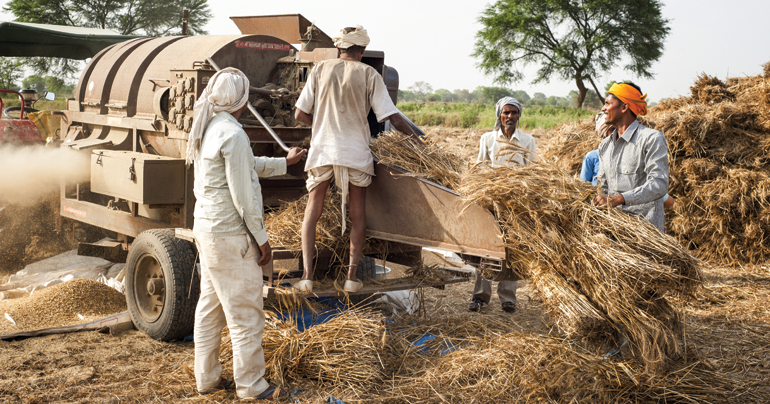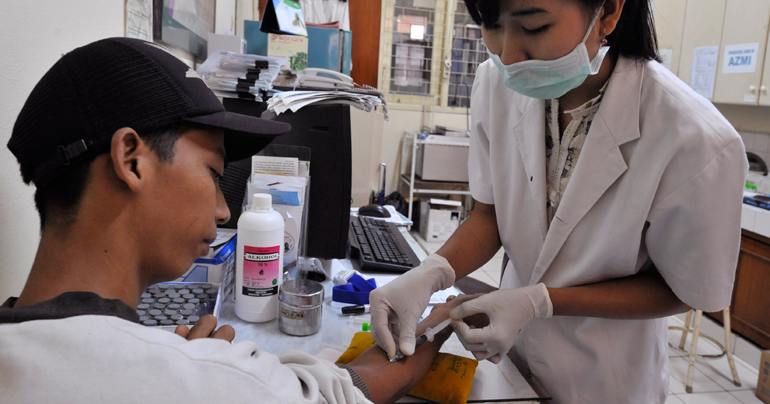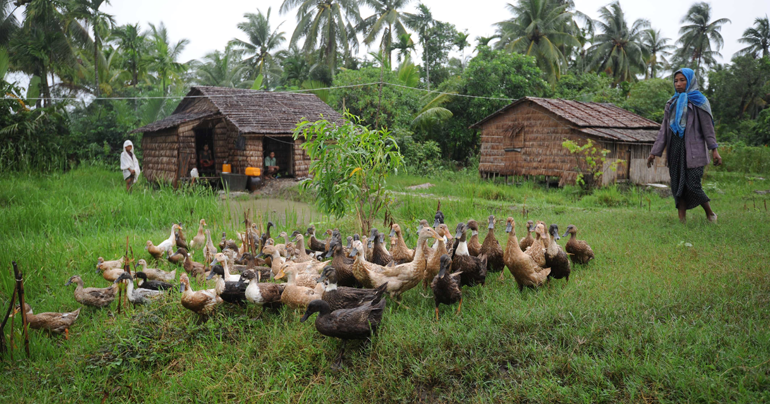Seven years ago, every man, woman and child in eight villages across India’s central state of Madhya Pradesh woke to find themselves on the threshold of utopia. For 18 months, while the world watched, more than 6,000 people in the impoverished Indian state received a monthly cash stipend to spend however they deemed fit – and with it, the promise of a life lived free from starvation and fear.
They were part of one of many pilot programmes trialling the radical concept of universal basic income across the globe. The Indian study was conducted by the Self-Employed Women’s Association with funding from Unicef to find out whether this vision for a world where every person is entitled to the common wealth of their nation could one day come to pass.
The pilot programme’s results were startling, said Basic Income Earth Network (BIEN) honorary co-president Guy Standing, who served as advisor on the initiative.
“In every village, what we found was improvements in nutrition, improvements in health and healthcare, improvements in school attendance and school performance by the children, with girls staying longer in school, and improvements in economic activity,” he told Southeast Asia Globe. “Work increased, investments in seeds and fertilisers and small-scale equipment increased, and, very strikingly, the status of women and the disabled went up considerably.”

Far from sinking into a torpor of lazy self-indulgence, most villagers used the funding to invest in tools for their own self-directed development, such as farm equipment and livestock. No longer forced to supplement their parents’ paltry incomes, children who had once left the classroom to slave away in blazing brick kilns returned to their studies. Fathers who had eked out precarious livings as wage labourers lining the pockets of wealthier men took once more to their own neglected fields.
The benefits went beyond individual recipients. Flush with fresh opportunity, a number of villagers pooled their money to convert a stagnant pool into a thriving fishery held in common by the whole community, supplementing their poor diets with a steady source of protein.
For Standing, the results were a radical fulfilment of the change he had hoped to see.
“The conclusion that I came to was that the emancipatory value of a basic income is greater than the money income,” he said. “We were giving amounts which were basically a third of subsistence – or, in the case of low incomes, 40% of subsistence. So it wasn’t a large amount, and yet they were turning that into significant improvements in their living standards and in the community.”
More just and more practical
The idea that every person is entitled to an income capable of meeting their basic needs is not a new one. Some researchers have even described the Buddha of the Pali canon as one of its earliest proponents. Thinkers as far apart as Thomas Paine and Milton Friedman have argued that some measure to ensure all members of society have the means to live their life is essential not just for a fair and equal society, but for one in which everyone is afforded the security and freedom to make rational economic decisions. Speaking at the Asia Society in September, Singapore Foreign Minister Vivian Balakrishnan recommended universal basic income as a potential solution to the proliferation of robots and artificial intelligence.
For some, the scheme is a grim necessity brought on by the steady advance of automation in once labour-intensive industries. For others, it is a radical call to fight back against the widening gulf between the wealthiest members of society and its impoverished underclass.
Tamara Nair, a research fellow at Singapore’s S. Rajaratnam School of International Studies, sees the strength of direct cash transfers in the flexibility they offer recipients – one denied them by more restrictive subsidies for basic necessities.
“What it’s about is, instead of trying in a roundabout way to help people, it’s just, ‘Look, I’m just going to give you this money, and you do what you want with it’,” she said. “And eight out of ten times, it happens that people who live below the poverty line use the money for necessities like food and things like education, setting up small businesses – whatever can sustain them over a longer period, some form of economic security.”

Nair is inspired by a promising 12-year universal basic income pilot programme in Kenya trialling unconditional electronic cash transfers across dozens of villages. She hopes that a more targeted form of basic income – one that puts money directly into the hands of women – can ensure a livelihood for half of the population, but also reduce the ingrained malnutrition that continues to hold back much of Southeast Asia.
“One of the biggest issues in the region is hunger and malnutrition,” she said. “We already know – and I know that I’m playing into gender roles here when I talk about women putting food on the table – but the fact is, that’s how societies operate in this part of the world. Can we give women money, cash handouts, and can that be used as a tool to address hunger and malnutrition?”
More than a quarter of all children under five in Southeast Asia suffer from physical or mental stunting caused by chronic malnutrition, with rates of stunting and acute malnutrition highest in Cambodia, Laos and Myanmar. Even more worryingly, figures from the United Nations Food and Agriculture Organisation show that the prevalence of people in the region who are severely food-insecure has risen dramatically from 46 million people in 2014 to almost 66 million last year – largely driven by worsening climate change.
While still in its early stages, Nair’s proposal highlights a fundamental divide in competing visions of basic income programmes. For Nair, targeted direct cash transfer schemes – already a powerful, if underfunded, tool in the fight against poverty – ensure that the first people to benefit from such programmes are those with the most to gain.
But proponents of a universal programme that would see a steady monthly stipend doled out to all members of society regardless of gender, wealth or weal – which could potentially be reclaimed from high-income earners through progressive taxation schemes – argue that universal basic income programmes are not only more just, but more practical than targeted schemes.
Although Standing stressed the moral necessity of a universal basic income scheme, he pointed out that targeted schemes require a level of bureaucratic busywork that could prevent the money from reaching the people who need it most. “We know that universal schemes, in other words, not targeted through means testing, actually help reduce inequalities much more effectively and are much more efficient,” said Standing. “They reach people and they involve much lower administrative costs than schemes which carefully target the poor, because they have to rely on means testing and all sorts of administrations, and in most cases, they don’t reach the poor. So the idea of having a more universalistic scheme as opposed to targeting actually turns out to be more equitable, more efficient and better for development.”
This is not to say that the transition to a universal basic income starts by stripping away any existing social safety net. Rather, direct cash transfers would serve as a solid foundation of no-strings-attached social assistance upon which more targeted welfare programmes could be built. With World Bank statistics showing as many as four out of five people in developing nations – including in Southeast Asian nations such as Cambodia and Laos, and parts of Indonesia and the Philippines – have never known the security of social protection, a universal basic income could be the perfect tool to stanch people’s suffering before more finely tuned programmes are rolled out.

Just how are we going to pay for this?
In Indonesia, where almost one in ten people – some 25 million souls – remain impoverished, direct cash transfers have been a key tool in the fight against poverty since the catastrophic financial collapse in the late nineties. Through the conditional cash transfer programme of that country’s PKH social assistance initiative, millions of low-income families across Indonesia receive financial rewards for ensuring their children attend regular health checks and stay in school.
Indonesia’s BLSM programme, on the other hand, is a temporary but unconditional cash transfer system first set up in 2008 to cushion the blow of rising fuel prices. But, although the poverty rate continues to fall, Ridho Al Izzati, a junior researcher at Indonesia’s Smeru Research Centre who has written extensively about poverty reduction programmes across the archipelago, said the poorest members of society continue to be cut off from the benefits of the nation’s impressive economic growth.
“Indonesia has spent a lot of money from the government budget on social assistance programmes – huge money, 15% to 20% of the government budget spent on social assistance programmes,” he said. “[But] the social assistance just gives the poor the minimum income. It’s not enough to let a household make an investment or generate income exponentially – it doesn’t have a big impact on generating income.”
For people such as Sugeng Bahagijo, executive director of the International NGO Forum on Indonesian Development, more radical solutions are needed. In a research paper and a newspaper editorial co-authored with BIEN’s Mickael B. Hoelman in 2014, the two called for the government to broaden the PKH into the Jaminan Tunai Indonesia (JTI) basic income programme to push back against widening inequality in the nation.
“The JTI should be made a universal basic income guarantee scheme covering three main vulnerable segments of the population in Indonesia: very old men and women and persons with disabilities,” they wrote. “They represent 15 percent of Indonesia’s total population of 240 million, or equivalent to 38 million people. These social groups will be the key beneficiaries and constituents.”
Bahagijo and Hoelman urged for as much as a quarter of the state budget to be spent on ensuring that the most vulnerable members of society receive the resources they need for financial independence. They argued that an unconditional basic income programme was essential for the re-democratisation of Indonesia’s economy and that it was a much-needed incentive to strengthen the nation’s notoriously weak tax system.
“[Recipients] will be entitled to a monthly guaranteed income of Rp 500,000 (US$43.2),” they wrote. “This will entail annual costs amounting to Rp 72 trillion for the elderly, Rp 120 trillion for people with disabilities and Rp 36 trillion for women, including single mothers. Total annual costs would reach Rp 228 trillion.”
It is at this point that the main criticism of any basic income scheme, targeted or universal, rears its head: just how are we going to pay for this?
Smeru’s Al Izzati said that although he saw a role for the private sector in any funding arrangement for basic income, it is crucial that the Indonesian government expand its tax revenue to ensure that the burden is borne by those who can most afford it.
“The challenge is Indonesia has limited budget capacity because the tax ratio is just 10% – it’s very low compared with other countries in the region,” he said. “So the first challenge is government budget capacity.”
But Standing maintained that many governments across the region are able to fund basic income programmes, recalling a report tabled last year by India’s finance minister alongside the national budget that described the scheme as eminently affordable.
“In the case of India, you could say that something like 9% of total government expenditure consists of subsidies, most of which do not reach the poor, they do not improve economic performance and they increase inequalities,” Standing said. “If you converted half of those subsidies into paying basic income, you could pay very good basic incomes to everybody. And the technological capacities these days for disseminating and distributing basic income cash payments is much more sophisticated than it used to be. The challenge is political: do you want to give people control of their lives and increase their capacities to develop their own communities and families?”
Standing said that even governments with less abundant natural resources had a host of mechanisms that would allow them to generate income to funnel into social programmes. He cited Alaska’s Permanent Fund, a state-owned investment fund that draws on the American state’s oil revenues to pay out a basic income to all residents regardless of wealth. He also called for a democratic twist on the sovereign wealth funds that already flourish in 60 nations around the world – one where levies on common resources, including taxes on carbon, wealth transfer and land, ensure that the wealth of nations be spread more equally among their citizens.
“The ability of governments to create sovereign wealth funds where you take royalties from natural resources and you put them in funds and invest the funds and then use the funds to pay out dividends to everybody – i.e., forms of basic income – is fantastic now,” he said.
More insidious is the creeping suspicion among critics that throwing free money at the poorest members of society will only see them squander it on liquor and luxuries – a myopic distrust of the disenfranchised that the Madhya Pradesh pilot, as well as the ongoing trial in Kenya, completely refute. Not only were households receiving a basic income almost a third more likely to increase their working hours compared to other households, but those that did used the funds to buy productive assets, investing in the tools they needed to make a living on their own terms.

Perhaps more importantly, in a region where household debt fuelled by a rapidly expanding microfinance industry is leaving more and more families trapped in a seemingly endless debt spiral, recipients were less likely to rely on loans to make ends meet. After a year, almost three quarters of households had been able to reduce their debt – and what money they were borrowing increasingly came from relatives rather than private moneylenders.
Standing emphasised that this kind of basic security was not just a human need, but a public good – and one that could bring social stability and economic prosperity, and stem the global rise of a nationalist politics based on bigotry and resentment.
“It’s something we all gain from,” he said. “Essentially, it gives people a sense of control – that they can make decisions more rationally and help out other people, whether family members or neighbours or the community in general, in times of need. Rather than going to expensive moneylenders or going chronically into debt, they can help out.”
Al Izzati said the idea that recipients of universal basic income would spend their newfound funds on boozing and gambling were simply not borne out by the pilots.
“We assess universal basic income, unconditional cash transfers in Indonesia, which is BLSM, has no impact on individual risk-taking behaviour,” he said. “It’s the kind of great idea that can help the economy work, that can help increase welfare for the poor, and there’s a lot of evidence and studies that have proved that universal basic income could benefit all of society.”
A matter of freedom
Ultimately, a large part of the struggle is putting pressure on politicians to explore new ways of confronting the ongoing challenges of hunger and poverty across the region, as well as investing in social infrastructure that will prepare these traditionally labour-intensive economies for the global shift towards greater industrial automation. Al Izzati said social assistance programmes that put power into the hands of poor people remained a tough sell in Indonesia.
“The challenge is political will – because the politicians have another agenda, and the development in Indonesia is more about building infrastructure for investment, increasing the business climate,” he said. “And we in Smeru keep pushing the government to have the political will to help the poor through this kind of social assistance. And I personally agree that universal basic income or unconditional cash transfers can be implemented in Indonesia.”
Standing said that while conventional wisdom had long held that the first truly universal basic income would rise from the social democracies of Scandinavia, the relatively undeveloped social safety nets of developing nations such as Cambodia and India made them ideal settings for wide-reaching direct cash transfer programmes that could serve as the foundation of more targeted social assistance measures.
“A basic income is a matter of giving modest improvements in freedom – all philosophies believe in freedom, ostensibly, at least, but you cannot be free if you’re chronically insecure,” he said. “And the freedom to say no to oppression or exploitation is a vital human need. A basic income at whatever level will improve that freedom.”


